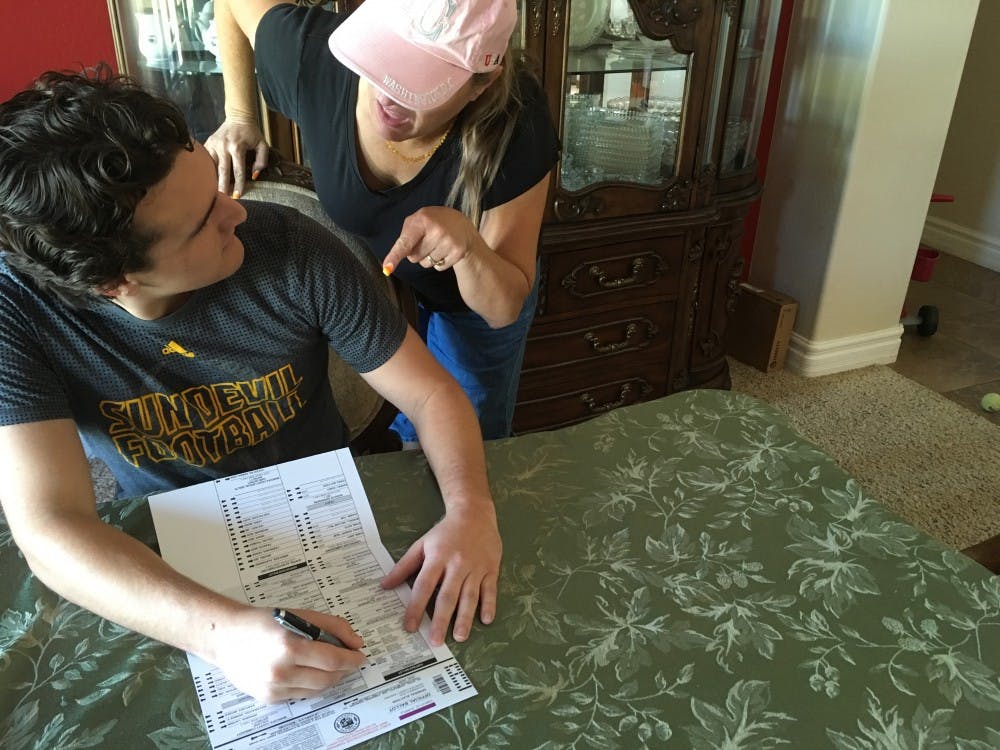It’s Wednesday night in the Atencio household. My mom, dad and I are sitting down to watch one of our favorite TV programs this time of year – the presidential debate.
As one of the candidates answers a question my dad comments, “(He/She) is right on that one.”
I pause the TV and sit in silence for a moment.
“What? How can you say that?” I reply aggressively.
We go back and forth for a few minutes before agreeing to let the candidates do the debating and continue watching.
This isn’t uncommon in my house - for me to disagree with my parents politically. While we agree on a lot of ideology, we don’t always agree on which candidates to support. Especially in this wild presidential election.

I’m not alone in disagreeing with my parents on the election. As of Oct. 13, Clinton holds 20-point lead among younger voters while Trump holds a 5-point advantage among middle-age voters, according to the Washington Post. My age and my parents' age is apparently at normal conflict.
This isn’t to ignore conventional wisdom that most kids follow after their parents. In 2005 Gallup found that 70 percent of teenagers felt their political leanings were about the same as their parents. However, new information points to the opposite. A study from the American Sociological Review finds that over half of “children” reject or misperceive their parents political affiliation.
Age demographic differences aren’t new. In 2012 President Obama had a 24-point advantage among 18 to 29 year olds and Mitt Romney earned a 5-point advantage among 45 to 59 year olds.
What’s new in this election is the amount that each candidate is disliked and the animosity between them and their supporters. On Sunday, the New York Times published a list of all of Trump’s Twitter insults since starting his campaign. In September, Hillary called half of Trump’s supporters deplorable, something she later apologized for.
(For those who are wondering, Trump once apologized for things he’s said in the heat of the moment and debates — but not what he said on Twitter).
Here is my request to those of you with parents you disagree with: Love them anyway and don’t hold it against them.
Jessica McPeak, English senior, said that while she only agrees with her parents about 60 percent of the time, she tries to let it go at the end of the day.
“They weren’t originally the most amicable discussions,” McPeak said of political conversations with her parents. “They’ve gotten more cordial over time.”
McPeak said that she has tried to understand where her dad is coming from, which is what keeps discussions more cordial.
“I try to keep in mind that he’s using a different lens,” McPeak said.
She thinks that in 20 years, who voted for who won’t be something we hold against our family members.
“At the end of the day I let it go,” McPeak said. “I don’t want to have that type of discord in my family.”
What's most important this political season is to remember that our loved ones must come first. Our families must always be more important than our political affiliation. Don’t put love of party or candidate over the people who are close to you. Don’t let the animosity of the candidates spill into your everyday life.
If you and your parents have struggled to end political discussions amicably, here is my advice:
End by telling them you love them, listen to their views, envision where they are coming from, remember that the freedom to debate is a blessing, be humble and lastly, tell them you love them. Give them a hug when you can.
The next day, apologize if you raised your voice, tell them how much you appreciate their input. Iron sharpens iron and discussing with those you disagree with will never be bad as long as discussion is polite.
If the candidates don’t have the civility our country needs, maybe we can teach them by rejecting their animosity.
Reach the columnist at maatenci@asu.edu or follow @mitchellatencio on Twitter.
Like The State Press on Facebook and follow @statepress on Twitter.
Editor’s note: The opinions presented in this column are the author’s and do not imply any endorsement from The State Press or its editors.
Want to join the conversation? Send an email to opiniondesk.statepress@gmail.com. Keep letters under 300 words and be sure to include your university affiliation. Anonymity will not be granted.




